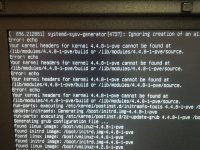# cat Xorg.0.log
[ 8041.629]
X.Org X Server 1.18.3
Release Date: 2016-04-04
[ 8041.629] X Protocol Version 11, Revision 0
[ 8041.629] Build Operating System: Linux 3.13.0-85-generic x86_64 Ubuntu
[ 8041.629] Current Operating System: Linux htpc1 4.4.6-1-pve #1 SMP Thu Apr 21 11:25:40 CEST 2016 x86_64
[ 8041.629] Kernel command line: BOOT_IMAGE=/ROOT/pve-1@/boot/vmlinuz-4.4.6-1-pve root=ZFS=rpool/ROOT/pve-1 ro boot=zfs root=ZFS=rpool/ROOT/pve-1 boot=zfs quiet intel_iommu=on
[ 8041.629] Build Date: 07 April 2016 09:18:50AM
[ 8041.629] xorg-server 2:1.18.3-1ubuntu2 (For technical support please see http://www.ubuntu.com/support)
[ 8041.630] Current version of pixman: 0.33.6
[ 8041.630] Before reporting problems, check http://wiki.x.org
to make sure that you have the latest version.
[ 8041.630] Markers: (--) probed, (**) from config file, (==) default setting,
(++) from command line, (!!) notice, (II) informational,
(WW) warning, (EE) error, (NI) not implemented, (??) unknown.
[ 8041.630] (==) Log file: "/var/log/Xorg.0.log", Time: Tue May 3 01:24:55 2016
[ 8041.630] (==) Using config file: "/etc/X11/xorg.conf"
[ 8041.630] (==) Using system config directory "/usr/share/X11/xorg.conf.d"
[ 8041.631] (==) ServerLayout "Layout0"
[ 8041.631] (**) |-->Screen "Screen0" (0)
[ 8041.631] (**) | |-->Monitor "Monitor0"
[ 8041.631] (**) | |-->Device "Device0"
[ 8041.631] (**) |-->Input Device "Keyboard0"
[ 8041.631] (**) |-->Input Device "Mouse0"
[ 8041.631] (==) Automatically adding devices
[ 8041.631] (==) Automatically enabling devices
[ 8041.631] (==) Automatically adding GPU devices
[ 8041.631] (==) Max clients allowed: 256, resource mask: 0x1fffff
[ 8041.631] (WW) The directory "/usr/share/fonts/X11/cyrillic" does not exist.
[ 8041.631] Entry deleted from font path.
[ 8041.631] (WW) The directory "/usr/share/fonts/X11/100dpi/" does not exist.
[ 8041.631] Entry deleted from font path.
[ 8041.631] (WW) The directory "/usr/share/fonts/X11/75dpi/" does not exist.
[ 8041.631] Entry deleted from font path.
[ 8041.631] (WW) The directory "/usr/share/fonts/X11/100dpi" does not exist.
[ 8041.631] Entry deleted from font path.
[ 8041.631] (WW) The directory "/usr/share/fonts/X11/75dpi" does not exist.
[ 8041.631] Entry deleted from font path.
[ 8041.631] (==) FontPath set to:
/usr/share/fonts/X11/misc,
/usr/share/fonts/X11/Type1,
built-ins
[ 8041.631] (==) ModulePath set to "/usr/lib/x86_64-linux-gnu/xorg/extra-modules,/usr/lib/xorg/extra-modules,/usr/lib/xorg/modules"
[ 8041.631] (WW) Hotplugging is on, devices using drivers 'kbd', 'mouse' or 'vmmouse' will be disabled.
[ 8041.631] (WW) Disabling Keyboard0
[ 8041.632] (WW) Disabling Mouse0
[ 8041.632] (II) Loader magic: 0x55ce00e91da0
[ 8041.632] (II) Module ABI versions:
[ 8041.632] X.Org ANSI C Emulation: 0.4
[ 8041.632] X.Org Video Driver: 20.0
[ 8041.632] X.Org XInput driver : 22.1
[ 8041.632] X.Org Server Extension : 9.0
[ 8041.632] (++) using VT number 7
[ 8041.632] (II) systemd-logind: logind integration requires -keeptty and -keeptty was not provided, disabling logind integration
[ 8041.633] (II) xfree86: Adding drm device (/dev/dri/card0)
[ 8041.633] (II) config/udev: Ignoring already known drm device (/dev/dri/card0)
[ 8041.638] (--) PCI: (0:1:3:0) 102b:0532:15d9:0404 rev 10, Mem @ 0xf6800000/8388608, 0xf7ffc000/16384, 0xf8000000/8388608
[ 8041.638] (--) PCI:*(0:6:0:0) 10de:1288:196e:1130 rev 161, Mem @ 0xf9000000/16777216, 0xd8000000/134217728, 0xd6000000/33554432, I/O @ 0x0000cc00/128, BIOS @ 0x????????/524288
[ 8041.638] (II) LoadModule: "glx"
[ 8041.639] (II) Loading /usr/lib/xorg/modules/extensions/libglx.so
[ 8041.644] (II) Module glx: vendor="NVIDIA Corporation"
[ 8041.644] compiled for 4.0.2, module version = 1.0.0
[ 8041.644] Module class: X.Org Server Extension
[ 8041.644] (II) NVIDIA GLX Module 361.42 Tue Mar 22 17:25:45 PDT 2016
[ 8041.644] (II) LoadModule: "nvidia"
[ 8041.644] (II) Loading /usr/lib/xorg/modules/drivers/nvidia_drv.so
[ 8041.645] (II) Module nvidia: vendor="NVIDIA Corporation"
[ 8041.645] compiled for 4.0.2, module version = 1.0.0
[ 8041.645] Module class: X.Org Video Driver
[ 8041.645] (II) NVIDIA dlloader X Driver 361.42 Tue Mar 22 17:04:20 PDT 2016
[ 8041.645] (II) NVIDIA Unified Driver for all Supported NVIDIA GPUs
[ 8041.645] (EE)
Fatal server error:
[ 8041.645] (EE) xf86OpenConsole: Cannot open virtual console 7 (No such file or directory)
[ 8041.645] (EE)
[ 8041.645] (EE)
Please consult the The X.Org Foundation support
at http://wiki.x.org
for help.
[ 8041.645] (EE) Please also check the log file at "/var/log/Xorg.0.log" for additional information.
[ 8041.645] (EE)


